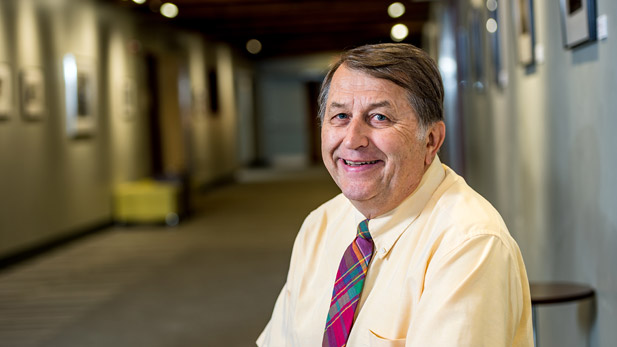Mottel Mixes Right Educational Chemistry

Ed Mottel emphasized collaboration between science, engineering and math, and developed learning exercises that connect chemistry with data analysis and observation during his 39 years on the Rose-Hulman faculty.
In the last hour of his final day of teaching chemistry on campus, Ed Mottel was in his office helping a student earn extra credit for a recent quiz about chemical nomenclature, a set of rules that generate systemic names for chemical compounds.
“It’s what we do at Rose-Hulman, helping students succeed,” says the retiring professor. “Really, it was a simple request. He had the correct answer, he just needed some reassurance that he was on the right track.”
Mottel has been contributing to the success of Rose-Hulman students for 39 years. Along the way, he helped develop the innovative integrated first-year curriculum that emphasized collaboration between science, technology, engineering and mathematics (STEM), and co-authored a general chemistry course manual that was used on campus for more than 30 years.
Colleagues describe Mottel’s learning exercises connecting chemistry principles with data analysis and observation as “truly genius” and his adaptation of computers in classrooms and laboratories as being “well ahead of its time.” He also has helped expand STEM education in Indiana high schools through the Hoosier Alliance of Science Teachers and made available opportunities for local high school students to participate in the Chemistry Olympiad program.
Some of that interest in introducing teenagers to the wonders of science came from his wife, Nancy, who was a local middle and high school biology teacher for more than 20 years before her retirement several years ago.
At Rose-Hulman, Ed Mottel taught courses in inorganic, general and organometallic chemistry nearly every quarter since joining the faculty in the fall of 1980 – in the same laboratories on the north end of Moench Hall. The equipment and technology have changed, but there’s been little modification to the elements of the chemical formulation process.
But, as he states, there’s more than chemistry being taught in Mottel’s classroom and laboratory sessions.
“The challenge is teaching students to do more than a one-step problem. They need to take things one, two or three steps farther. That’s where the real answers are,” he says. “The laboratory teaches you to be self-reliant. You’re the one measuring the elements, mixing things together and examining the results. Students have to get beyond the practice of just following the guidelines.”
Mottel continues, “The teacher’s task isn’t showing students what to do, but to guide them and help them piece together the pattern, from start to finish, to accomplish the assignment. I have always been in search of those ‘light-bulb moments’ when you could see that glimmer in a students’ eye. You knew they got it. I would step back, smile and tell them ‘see, that wasn’t very hard.’”
Besides his teaching, Mottel also got to know students by serving as a faculty adviser for the campus’ chapter of the Triangle fraternity, a social organization for male students majoring in engineering, architecture and science.